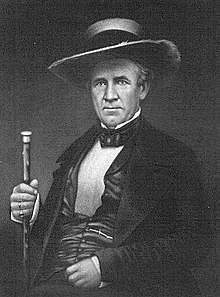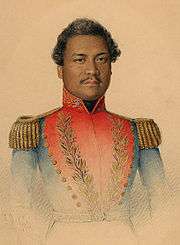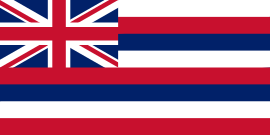John Ricord
John Ricord (September 5, 1813 – March 26, 1861) was a lawyer and world traveler. He was involved in cases in Texas, Oregon, Hawaii, and California.
John Ricord | |
|---|---|
 | |
| Born | September 5, 1813 |
| Died | March 26, 1861 (aged 47) Paris |
| Nationality | United States |
| Occupation | Lawyer |
| Parent(s) | Jean Baptiste Ricord de Madianna Elizabeth Stryker |
Life
John Ricord was born on September 5, 1813, in Belleville, New Jersey.[1] His mother, Elizabeth Stryker, was an educator and writer. His father, Jean Baptiste Ricord de Madianna, was a physician and naturalist who had escaped the French Revolution with his parents. The first John Ricord grew up at the home of his maternal grandparents in Belleville, New Jersey, after his parents separated. His brother, Frederick William Ricord, became a judge and Mayor of Newark, New Jersey, then wrote articles on the history of New Jersey as secretary of the New Jersey Historical Society.[2] He studied law in 1829 in the office of his uncle, James Stryker, and was admitted to the bar in Buffalo, New York, on March 12, 1833.[3]
Texas
 |
|
Clients included Texan Sam Houston (above) and Hawaiian King Kamehameha III (below) |
 |
Some time in the next few years another uncle, John Stryker, encouraged him to go to the Republic of Texas. Ricord reached Velasco, Texas, in the summer of 1836 and was hired by President David G. Burnet as private secretary. Ricord then served President Sam Houston as his secretary, then chief clerk in the State Department and District Attorney of the Fourth Judicial District on December 19, 1836.[4]
Oregon
In 1837 Ricord left Texas before his term expired.[5] He practiced law at some time in Florida. He joined a wagon train from St. Louis, Missouri, to the Oregon Territory by 1843. He was retained by Alvin F. Waller as lawyer for a land dispute against John McLoughlin of the Hudson's Bay Company.[6][7] He left from Vancouver, British Columbia in late 1843 with a group of missionaries including Jason Lee and Gustavus Hines.[8]
Hawaii
Ricord arrived February 27, 1844, in the Hawaiian Islands on the Columbia. He was the first Western-trained lawyer in the islands.[9][10] The previous year a land dispute by Richard Charlton led to a British occupation known as the Paulet Affair. A related case of Ladd & Co. required lengthy arbitration. These and one other case would consume his entire time on the islands.[11]
He was described as:
...a restless adventurer practicing law on the frontiers of American expansionism, ...he was a true frontiersman, acting in legal debate like a fast draw sheriff who dared his opponent to test him.[12]
Within a few weeks he swore allegiance to King Kamehameha III and on March 9, 1844, was appointed first Attorney General and Registrar of Conveyances of the Kingdom of Hawaii. In July 1845 he joined the Privy Council of Kamehameha III.[13] On October 29, 1845, the executive branch of the government was formally organized through legislation he proposed. On February 10, 1846, he became a founding member of a board to review land titles. Former missionary William Richards was elected president of the board, and another former missionary Lorrin Andrews was appointed as a judge.
On May 17, 1847, he resigned all his offices, and on June 12 was released from his oath of allegiance, so he could resume his citizenship of the United States.[13] He left August 19, 1847.[14] The office of Attorney General was suspended until the 1860s.[15] His work on organizing the courts was taken over by the second trained attorney to arrive in the islands, William Little Lee. The cause for his departure has been speculated as a power struggle with Gerrit P. Judd. A former client from his Florida days might have also had a dispute that caught up with him.[12]
California
On September 24, 1847, Ricord arrived in Monterey, California. He made an attempt to talk William Tecumseh Sherman and Richard Barnes Mason, then military governor of California, into letting him design a government for the territory as he had done for Hawaii.[16] He was selected to judge a case between Thomas J. Farnham and William Robert Garner.[17] During the California Gold Rush of 1849 he first speculated on a Mercury mine with Thomas O. Larkin and then ran a store.[18]
However, he must have not been successful in his business, because by 1853 he asked the legislature of the Hawaiian Kingdom to resolve him of his debts. The resolution failed. At some point he ended up on a ship that was involved with Juan José Flores, who had been involved in the revolution of Ecuador.[19]:237 It is not known if he returned himself to Hawaii. He is recorded as buying 6,102 acres (2,469 ha) of land surveyed by Chester Lyman in present-day Santa Clara County, California to the south of Rancho San Antonio.[20]
Demise
He spent short periods in Tahiti, Thailand, and other places in the Pacific Ocean.[21]
In December 1859 Ricord was in Austin, Texas (now capital of the U.S. State) and persuaded the Texas Legislature to grant him land and salary for his services to the republic 33 years earlier.[22] He then returned to visit relatives in New Jersey and after a few months went to Liberia. He died in Paris on March 26, 1861, at the home of his uncle Philippe Ricord, personal physician to Napoleon III. Ricord is buried in Père Lachaise Cemetery.
See also
- Attorney General of Hawaii
- Great Mahele
References
- Register of Baptisms, Births, Marriages, Membership, etc. In the Dutch Reformed Church, Stone House Plains, New Jersey 1801, p. 50.
- Wilson, J. G.; Fiske, J., eds. (1888). . Appletons' Cyclopædia of American Biography. 5. New York: D. Appleton. p. 247.
- John Hayward (1834). The New-England and New-York law-register, for the year 1835. p. 215.
- James L. Haley (2004). Sam Houston. University of Oklahoma Press. ISBN 978-0-8061-3644-8.
- Biennial report of the Texas Library and Historical Commission. 1. p. 95.
- Frederick Van Voorhies Holman (1907). Dr. John McLoughlin, the father of Oregon. The A. H. Clark company.
- Hubert Howe Bancroft (1902). West American history. Volume 29, Part 1. The Bancroft Co. pp. 211–215.
- Gustavus Hines (1889). Wild life in Oregon: being a stirring recital of actual scenes of daring and peril among the gigantic forests and terrific rapids of the Columbia river. R. Worthington.
- Jon M. Van Dyke (2008). Who owns the Crown lands of Hawaii?. University of Hawaii Press. p. 34. ISBN 978-0-8248-3211-7.
- Frear, Walter F. (1894). "Evolution of the Hawaiian Judiciary". Papers of the Hawaiian Historical Society. Honolulu: Hawaiian Historical Society (7). hdl:10524/966.
- John Ricord, Stephen H. Williams, James F. B. Marshall (1846). Report of the proceedings and evidence in the arbitration between the King and Government of the Hawaiian Islands and Messrs. Ladd & Co., before Messrs. Stephen H. Williams & James F. B. Marshall, arbitrators under compact. C.E. Hitchcock, printer, Hawaiian Government press.CS1 maint: uses authors parameter (link)
- Jane L. Silverman (1982). "Imposition of a Western Judicial System in the Hawaiian Monarchy". Hawaiian Journal of History. 16. Hawaiian Historical Society, Honolulu. pp. 48–64. hdl:10524/197.
- "Ricord, John office record". state archives digital collections. state of Hawaii. Archived from the original on 2012-03-06. Retrieved 2010-03-12.
- "Passport records". state archives digital collections. state of Hawaii. Retrieved 2010-03-12.
- "Attorney General's Department - Organization of" (PDF). state archives digital collections. state of Hawaii. Archived from the original (PDF) on 2010-05-27. Retrieved 2010-03-12.
- William Tecumseh Sherman (1990) [1892]. Memoirs of General W.T. Sherman. Plain Label Books. pp. 88–91. ISBN 978-1-60303-649-8.
- William Robert Garner, Donald Munro Craig (1970). Letters from California, 1846-1847. University of California Press. ISBN 978-0-520-01565-4.CS1 maint: uses authors parameter (link)
- Richard A. Greer (1970). "California Gold - Some Reports to Hawaii". Hawaiian Journal of History. 4. Hawaii Historical Society. pp. 157–173. hdl:10524/147.
- Robert Crichton Wyllie (1854). Motion in the Hawaiian Parliament to release John Ricord, Esquire, His Majesty's attorney general, from a debt standing against him in the books of the King's Treasury, since June, 1847. Hawaii Department of Foreign Affairs.
- "Diagram of southern half of San Antonio Rancho sold to John Ricord". The Bancroft Library, University of California, Berkeley. 1853. Retrieved 2010-03-13.
- Ralph Simpson Kuykendall (1965) [1938]. Hawaiian Kingdom 1778-1854, foundation and transformation. 1. University of Hawaii Press. ISBN 0-87022-431-X.
- Special Laws passed by the Eighth Legislature of the state of Texas. John Marshall & Co. 1860. pp. 7 and 245.
Further reading
- Charleen Aina (October 1999). "John Ricord: Hawaii's First Attorney General". Hawaii Bar Journal. pp. 104–105.
- Andrew Forest Muir (July 1948). "John Ricord". Southwestern Historical Quarterly. pp. 49–59.
External links
- Andrew Forest Muir: Ricord, John from the Handbook of Texas Online. Retrieved 2010-03-13.
- . Encyclopedia Americana. 1920.
- . New International Encyclopedia. 1905.
- All about Hawaii. The recognized book of authentic information on Hawaii, combined with Thrum's Hawaiian annual and standard guide ((original from University of Michigan)). Honolulu Star-Bulletin. 1891. pp. 92–97 – via HathiTrust.
- "A List of All the Cabinet Ministers Who Have Held Office in the Hawaiian Kingdom"
- Woods, Roberta. "LibGuides: Hawai`i Legal Research: Attorney General Opinions". law-hawaii.libguides.com.
- Includes a list of Attorneys General for the Kingdom of Hawaii, their salaries and budgets
